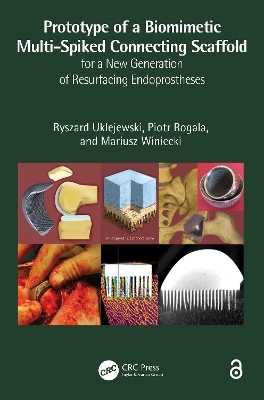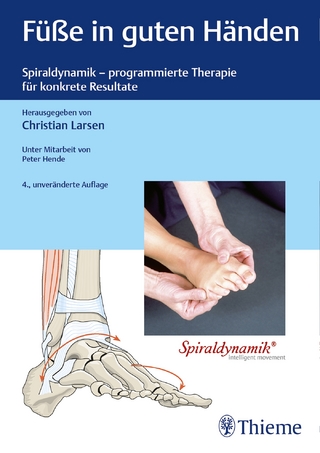
Prototype of a Biomimetic Multi-Spiked Connecting Scaffold for a New Generation of Resurfacing Endoprostheses
CRC Press (Verlag)
978-1-032-41844-5 (ISBN)
The monograph comprehensively presents the research on the prototype of the biomimetic Multi-Spiked Connecting Scaffold (MSC-Scaffold) for cementless fixation of the components of a new generation of resurfacing arthroplasty (RA) endoprostheses. This research, carried out by a bioengineering-surgical team from three Polish universities, includes bioengineering design, rapid prototyping, manufacturing in selective laser melting, functionalization, surface modification, numerical studies, experimental in vitro studies, and pilot surgical experiments in an animal model.
Features:
Presents the prototype of the multi-spiked connecting scaffold for a new generation of resurfacing endoprostheses of the knee and the hip
Explains this prototype scaffold as the first worldwide design of the biomimetic fixation of components of diarthrodial joints resurfacing endoprostheses
Insights into the entire process of bioengineering design and research on this novel way of resurfacing endoprostheses fixation
Reviews main results of the scaffold prototyping and SLM manufacturing, structural and osteoconductive functionalization, and surface modification
Reports experimental and numerical investigations of mechanical behavior of the scaffold-bone system, cell culture studies, and pilot surgical experiments in animal models
This book is aimed at professionals and graduate students in biomedical engineering, biomaterials engineering, and bone & joint surgery.
The Open Access version of this book, available at http://www.taylorfrancis.com, has been made available under a Creative Commons [Attribution-Non Commercial-No Derivatives (CC-BY-NC-ND)] 4.0 license.
Ryszard Uklejewski, Ph.D., Eng, PhD, MD is a Professor of Biomedical Engineering. He received an MSc from Poznan University of Technology, Poland (1974), and a Ph.D. at the Technical University of Lodz (in Electromechanics, 1979), and studied mathematics (1976-1980) at the University of Lodz, Poland. He is also a qualified medical doctor (1996, Karol Marcinkowski University of Medical Sciences in Poznan, Poland), and received the PhD in Medicine (in Endocrinology) at the University of Medical Sciences in Poznan (2010). He worked (1974-1996) in the Department of Mechanics and Acoustics of Porous Materials at the Institute of Fundamental Technological Research, Polish Academy of Sciences. In 1995 he received the Habilitation in Biomedical Engineering from the Institute of Biocybernetics and Biomedical Engineering, Polish Academy of Sciences with a thesis on bioelectromechanics of porous bone filled with physiological viscous ionic fluid. He works (1997 til now) at the Kazimierz Wielki University in Bydgoszcz (Poland) as the Head of the Department of Medical Bioengineering Fundamentals in the Institute of Technology, currently in Chair of Constructional Materials and Biomaterials at the Faculty of Materials Engineering. His main research areas are structural-biomechanical biocompatibility of bone-implant interface on the basis of the modern two-phase poroelastic biomechanical model of bone tissue and of the theory of poroelastic materials, bone tissue biomechatronics, and the endocrinology of growing human skeleton. He is the author of more than 180 research publications, the inventor of the patent on the non-invasive method of determination of density and poroelastic parameters of osteoporotic long bones, and the head of two research projects of the Polish Ministry of Science and the National Science Centre Poland on the development of prototypes of non-cemented RA endoprostheses (invented by Professor P. Rogala), realized in Poznan University of Technology. He is a member of the American Biographical Institute Research Association, the European Federation for Research in Rehabilitation, Polish Society for Biomaterials, a former member of AAAS and NYAS (for at least 10 years); is included in "2000 Outstanding Scientists of the 20th Century" by International Biographical Centre of Cambridge, UK. Piotr Rogala, MD, Ph.D. is an Associate Professor of Orthopaedic Surgery in the Department of Spine Surgery, Oncologic Orthopaedics and Traumatology of Karol Marcinkowski University of Medical Sciences in Poznan (Poland) and in the Institute of Health Sciences, State School of Higher Education in Gniezno (Poland) with more than 30 years of international clinical experience (France, Tunisia, Republic of South Africa), and the orthopaedic biomechanics Consultant in the Department of Medical Bioengineering Fundamentals, Kazimierz Wielki University in Bydgoszcz (Poland). He is the inventor and patent owner of the new model of resurfacing arthroplasty endoprostheses and the author of the original concept of the multi-spiked connecting scaffold (MSC-Scaffold) for fixation of resurfacing arthroplasty components in surrounding bone with minimally invasive operating procedures. He is a member of several international scientific associations (European Federation of National Associations of Orthopaedics and Traumatology, European Orthopaedic Research Society, European Federation for Research in Rehabilitation, etc.). He is particularly interested in orthopaedic biomechanics, the etiopathology of adolescent idiopathic scoliosis, and clinical genetics of bone diseases; The author of more than 170 research publications, the head of two research projects of the Polish Ministry of Science in the field of clinical orthopaedics and genetics; is included in Encyclopaedia Britannica, USA. Mariusz Winiecki, PhD-Eng, is an Assistant Professor in the Chair of Constructional Materials and Biomaterials at the Faculty of Materials Engineering at the Kazimierz Wielki University in Bydgoszcz, Poland. In 2001 he received the MSc in Mechanical Engineering (specialization in Mechatronics) at Poznan University of Technology, Poland, and in 2006 he received PhD in Mechanical Engineering at Poznan University of Technology, Poland, for the PhD thesis on the investigation of the micro-geometrical constructional properties of porous endosseous implants and the influence of these properties on the strength of the bone-implant model fixation (PhD supervisor: Prof. R. Uklejewski). In 2007 he finished Postgraduate Studies in the field of Biomaterials Engineering at AGH University of Science and Technology in Cracow, Poland and since 2007 he is a member of the Polish Society for Biomaterials. His main research areas in the field of biomaterials engineering are the engineering of bone-implant interfacing, design and implant surface functionalization towards improving the conditions for osseointegration. He has achievements in works of the interdisciplinary research group that has designed, prototyped and manufactured in the selective laser melting technology, and developed through bioengineering research, the essential innovation in fixation of components of a new generation of entirely cementless resurfacing hip arthroplasty endoprostheses in the subchondral trabecular bone by means of the biomimetic multi-spiked connecting scaffold – he was a key investigator in two research projects of the Polish Ministry of Science and the National Science Centre Poland, concerning on the development of prototypes of non-cemented resurfacing arthroplasty endoprosthesis, realized at Poznan University of Technology. He is the author of more than 90 scientific papers.
Chapter 1. Characteristics of contemporary hip resurfacing arthroplasty endoprostheses and their possible postoperative complications. Chapter 2. Idea of entirely non-cemented implantation of the components of hip resurfacing arthroplasty endoprostheses with the multi-spiked connecting scaffold. Chapter 3. Design, rapid prototyping, and manufacturing of the biomimetic multi-spiked connecting scaffold prototype for non-cemented resurfacing endoprostheses. Chapter 4. Structural and osteoconductive functionalization of the interspike space of the prototype multi-spiked connecting scaffold. Chapter 5. Formation of osteoinductive and osseointegrative properties of the bone-contacting surface of the multi-spiked connecting scaffold prototype by the electrochemical cathodic deposition of calcium phosphates. Chapter 6. Research on the system of bone and the prototype multi-spiked connecting scaffold in order to design the structural and biomechanical properties of this system. Chapter 7. Pilot study on the prototype multi-spiked connecting scaffold for non-cemented resurfacing endoprostheses in an animal model. Chapter 8. Pilot microCT study of the impact of embedding the multi-spiked connecting scaffold on the density and compressive strength of the subchondral trabecular bone of femoral heads from patients with osteoarthritis. Chapter 9. Summary, conclusions, and final remarks.
| Erscheinungsdatum | 22.08.2023 |
|---|---|
| Zusatzinfo | 15 Tables, black and white; 47 Line drawings, black and white; 102 Halftones, black and white; 149 Illustrations, black and white |
| Verlagsort | London |
| Sprache | englisch |
| Maße | 156 x 234 mm |
| Gewicht | 320 g |
| Themenwelt | Medizin / Pharmazie ► Allgemeines / Lexika |
| Medizin / Pharmazie ► Physiotherapie / Ergotherapie ► Orthopädie | |
| Naturwissenschaften ► Biologie | |
| Technik ► Maschinenbau | |
| Technik ► Medizintechnik | |
| Technik ► Umwelttechnik / Biotechnologie | |
| ISBN-10 | 1-032-41844-3 / 1032418443 |
| ISBN-13 | 978-1-032-41844-5 / 9781032418445 |
| Zustand | Neuware |
| Informationen gemäß Produktsicherheitsverordnung (GPSR) | |
| Haben Sie eine Frage zum Produkt? |
aus dem Bereich


